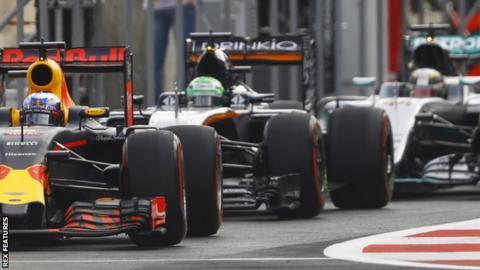
Formula 1 teams are to be given the chance to buy shares in the sport for the first time following a takeover by US giant Liberty Media.
The first stage of a buyout was completed on Wednesday, with Liberty taking 18.7% in a deal that values F1 at $8bn (£6.25bn).
The full takeover, which will see Liberty with a controlling 35.3% stake, is due to be completed by early 2017.
Liberty said teams “will be given the opportunity to participate in the investment”, adding that some had expressed interest.
The leading Mercedes, Ferrari, Red Bull and McLaren teams are considered the most likely to take up the opportunity.
Bernie Ecclestone, the current boss of F1, is to remain on board as chief executive.
Red Bull team principal Christian Horner, a close ally of Ecclestone, said the takeover “feels like a positive move and the ongoing involvement of Bernie Ecclestone as CEO is key to that”.
He added: “Bernie’s been central to every development of Formula 1 for the past 40-odd years. He will be intrinsic to the new owners establishing themselves and being able to lead the sport successfully in the future.”
A McLaren spokesman said: “It is obviously a significant development, which has only just occurred, but from what we already understand we are confident that it will be a positive step for Formula 1.”
Ecclestone, 85, will work alongside the new chairman, US media magnate Chase Carey, who is a long-time lieutenant of media mogul Rupert Murdoch.
Carey said the aim of the takeover was to expand the sport and extend its reach.
“The opportunity is to grow and develop this sport for the benefit of the fans, teams, partners and our shareholders by increasing promotion and marketing of Formula 1 as a sport and brand,” he said.
“Enhancing the distribution of content, especially in digital – currently a very small percentage of revenue.”
What will change?
Liberty identified a number of areas for growth:
- Evolving the race calendar
- Establishing a broader range of commercial partnerships, including sponsorships
- Increasing the promotion and marketing of F1 as a brand
- Leveraging Liberty’s expertise in live events and digital monetisation to make our events bigger than ever
Will F1’s focus alter?
Ecclestone’s stewardship of F1 under CVC in recent years has marked a decline in the number of races in Europe, the sport’s traditional heartland.
This is because countries in western democracies find it harder to justify the huge race fees demanded by Ecclestone, compared with countries with authoritarian regimes such as Bahrain, Russia, Azerbaijan, who are all reputed to pay at least $40m annually for their races.
Carey said new markets were “opportunities” and that he wanted to “expand the sport in places like the Americas and Asia”.
But he added that races in Europe were “the home and foundation” of F1 and “of critical importance”.
He added: “Building the sport in Europe, building on that foundation, has got to be second to none. We do want to take advantage of the global footprint of this sport, we want to focus on it.”
Carey also hinted that Liberty would invest in expanding the popularity of F1 in the US, where the sport has found it difficult to find a consistent base.
There is currently one race in the US, in Austin, Texas, which has hosted it since 2012, before which there was a five-year absence following the collapse of the previous race in Indianapolis in Indiana.
Carey said: “In the longer term, markets like the US and key Asian markets are opportunities to develop. We’re not going to do that overnight.
“But there are huge audiences there. If we reach those fans using digital platforms and some of the tools that haven’t been exploited aggressively, we can build a whole new generation of fans in places that, historically, have been as significant a part of the Formula 1 fanbase.”



